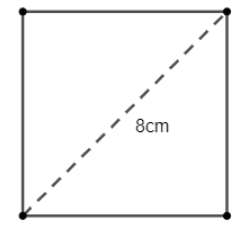
If the diagonal of a square is 8 cm, then its area is
(a) $4c{{m}^{2}}$
(b) $16c{{m}^{2}}$
(c) $24c{{m}^{2}}$
(d) $32c{{m}^{2}}$
Answer
594.9k+ views
Hint: Use the property that area of the square is equal to half of the square of the length of the diagonal of the square, i.e., area of the square is $\dfrac{{{l}^{2}}}{2}$ , where l is the length of the diagonal. So, just put the length of the diagonal in the formula and solve to get the answer.
Complete step-by-step answer:
Let us start the solution to the above question by drawing a representative diagram of the situation given in the figure.

Now we know that the area of the square is equal to half of the square of the length of the diagonal of the square.
$\therefore \text{ Area of the square = }\dfrac{{{\left( diagonal \right)}^{2}}}{2}$
Now, it is given that the length of the diagonal of the square is 8cm. So, if we put this in our equation, we get
$\text{Area of the square = }\dfrac{{{8}^{2}}}{2}$
Now, we know that the square of 8 is equal to 64.
$\text{Area of the square = }\dfrac{64}{2}=32c{{m}^{2}}$
Therefore, the area of the square whose diagonal is 8 cm in length is equal to 32 sq cm.
Hence, the answer to the above question is option (d).
Note: We could have also solved the above question using the property that the diagonal of a square is $\sqrt{2}$ times the length of its side followed by the use of the formula that the area of the square is equal to the square of the length of its side.
Complete step-by-step answer:
Let us start the solution to the above question by drawing a representative diagram of the situation given in the figure.

Now we know that the area of the square is equal to half of the square of the length of the diagonal of the square.
$\therefore \text{ Area of the square = }\dfrac{{{\left( diagonal \right)}^{2}}}{2}$
Now, it is given that the length of the diagonal of the square is 8cm. So, if we put this in our equation, we get
$\text{Area of the square = }\dfrac{{{8}^{2}}}{2}$
Now, we know that the square of 8 is equal to 64.
$\text{Area of the square = }\dfrac{64}{2}=32c{{m}^{2}}$
Therefore, the area of the square whose diagonal is 8 cm in length is equal to 32 sq cm.
Hence, the answer to the above question is option (d).
Note: We could have also solved the above question using the property that the diagonal of a square is $\sqrt{2}$ times the length of its side followed by the use of the formula that the area of the square is equal to the square of the length of its side.
Recently Updated Pages
Master Class 8 Social Science: Engaging Questions & Answers for Success

Master Class 8 English: Engaging Questions & Answers for Success

Class 8 Question and Answer - Your Ultimate Solutions Guide

Master Class 8 Maths: Engaging Questions & Answers for Success

Master Class 8 Science: Engaging Questions & Answers for Success

Master Class 9 General Knowledge: Engaging Questions & Answers for Success

Trending doubts
What is BLO What is the full form of BLO class 8 social science CBSE

Citizens of India can vote at the age of A 18 years class 8 social science CBSE

Full form of STD, ISD and PCO

Advantages and disadvantages of science

Right to vote is a AFundamental Right BFundamental class 8 social science CBSE

What are the 12 elements of nature class 8 chemistry CBSE




